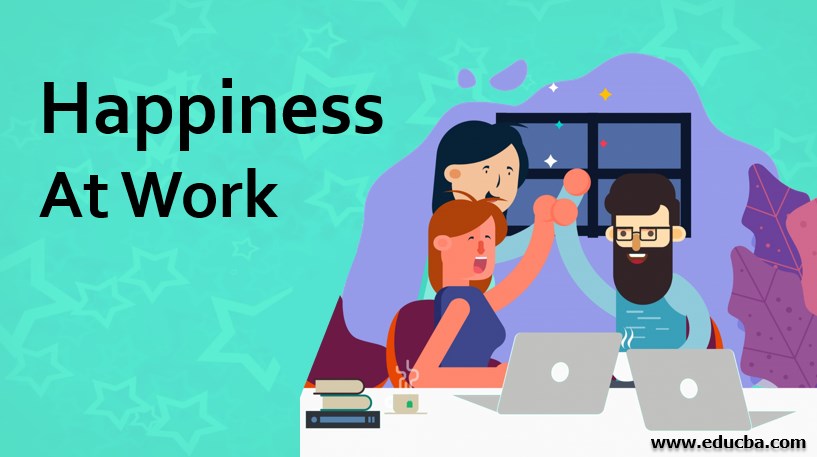Updated April 21, 2023

Happiness At Work
Happiness is a relative term, but still, so much depends on it, mostly everything, to be precise. So then, why happiness at work gets so little emphasis? Maybe because the people who think about productivity can’t equate happiness at work with productivity! But it’s being proven repeatedly by countless studies, research papers, and daily experiences that happiness at work has a crucial role in ensuring productivity at work.
But do you know how it works? In this guide, we will reveal how. Yes, it’s not a quick fix or a model for punching cards and making people happy. Instead, it’s a tool you can use to build a productive culture. Of course, happy people are always productive people, even if there are some exceptions, but still, a majority of organizations in the world agree that when they invest in their people’s well-being, things improve a lot more. Their profits skyrocketed, their reputation got enhanced, and even they were looked at by the externals as great places to work for.
Do you think that happiness at work has so much power that it can transmute a long-ranging battle of productivity into a simple resolution?
Yes, it can.
In this article, first, we try to understand why happiness at work has so much power and why this single thing can solve almost all the issues in an organization. Then we will throw light on how you can do the same. Ultimately, we will critically analyze what happiness at work fails to do. Overall, it’s a comprehensive read on why happiness at work is the prime source of productivity in an organization.
Let’s dive in.
Why is Happiness at Work the Prime Source of Productivity and Profitability in any Organization?
Mr. A and Mr. B worked in an organization for several years. Both served the company well, earned decent money, and did everything possible to make the organization productive and profitable.
Mr. A retired from being a manager of the company, and Mr. B served as a President of the company; after retirement, he is still on the company’s board of directors.
Mr. A and Mr. B have almost no difference in education and work; both were hardworking individuals.
Then why so much difference in results?
Only one thing – happiness at work!
Mr. A wasn’t happy, and even if he did everything, he was not feeling satisfied doing it. But, on the other hand, Mr. B did everything with happiness. And you can see the result right before your eyes.
Happiness at work is the differentiator. When a person is happy, he is always thinking about the possibility, and that one thing keeps us going, not only top-level executives but all of us.
When one isn’t happy, s/he can’t concentrate on the things that matter. As a result, his/her mind is full of cluttered thoughts, s/he doesn’t use his/her mind well, and at the same time, s/he doesn’t create any neurons in his/her brain.
Image source: pixabay.comRecent research proves that every human creates new neurons every day, and this phenomenon is called neurogenesis. When human beings are happy, there is no stress, and they can concentrate on learning new things, creating new systems, improving their work, moving faster, doing better, and working harder. Even happy people do not deprive themselves of sleep. So they create new brain cells daily when they happily do any work.
On the contrary, people who are sad or anxious release a hormone called cortisol which is toxic to the brain and doesn’t help an individual much. S/he tends to make more mistakes and drops his/her thinking ability.
Numerous research studies have repeatedly proven that happiness is the ultimate form of a good life. Thus it can be said easily that happiness at work is the prime source of productivity and profitability.
Here’s how it happens.
Once you make efforts to make your employees realize that happiness at work is of utmost importance and take steps to make them happy, productivity and profitability will be their natural by-products.
But there is a big misconception that happiness at work can be obtained through the employer’s effort. No. Unfortunately, each one is responsible for his/her satisfaction. Employers can only pave the path, understand the value of employees’ personal lives and help them be happy. But employees need to take responsibility for their happiness.
The publisher of Success Magazine, Darren Hardy, often talks about it. If you’re collaborating, doing any project together, or deciding on a life change, you’re 100% responsible for making it happen.
If you read this now, know that bringing happiness to work is your choice. You can enhance your happiness by studying, cultivating, and teaching the principles we will learn now, and as a result, help yourself and your company become productive and profitable.
Recently, the ‘happiest man on earth was found out and recognized, and neuroscientists are saying that his mind is always very light, and thus he can let go of most of his thoughts.
When asked what his secret to being happy is, he said – Instead of doing something for yourself, think about how you can help others, and you will be happy.
The happiest person on earth is a monk, but to bring happiness at work, you don’t need to become a monk; rather, you must follow certain principles and practice those principles in your daily life.
And whoa! Happiness at work will result in staggering productivity and whopping profits.
How to bring happiness to work?
-
Improve your relationship
Harvard has been researching what makes a person happy, and they are studying thousands of people from their sophomore years to their late 80s, and the study is now 75 years old.
They found then the basic source of having a good life is to be happy. And to be happy, each needs good relationships they can bank upon. Happiness at work is also about having good relationships with managers, peer groups, and subordinates and feeling a sense of belonging.
A workplace that can provide good relationships and value human bonding more than profits eventually earn more productivity and profits!
-
Learning is primary
When people learn, they get better. Yes, not only in acquiring knowledge and skills but in creating better brains.
Neuroscientists find that when we learn, our brain creates new cells, our hippocampus works far better, and thus we tend to become happier, smarter, and better.
That means when an organization focuses on creating an environment for learning for its employees, the employees become happier, and their happiness at work brings in more productivity. On average, despite being invested four billion dollars yearly worldwide for training and development purposes, few companies still view T&D as costs instead of an accelerator of happiness at work and productivity.
Invest in your employees’ learning if you want to sustain for a long time, earn significant profits, and help many more people worldwide. The more they will learn more happiness at work they will ensure, and as a result, all that you want from your business will be achieved.
-
Mediation at work
It’s being said that the difference between people who do meditation and those who don’t are staggering. Even with meditation, people are happier, more innovative, and more intelligent over time.
Many organizations nowadays realize the value of meditation and want to ensure it brings work happiness.
At the office and in their personal lives, employees always suffer from stress. Meditation can help them relax, connect with their highest source, and, as a result, bring more happiness at work.
Once they feel happier, they work better, feel relaxed, and their product reaches the roof. And at the end of the day, the primary beneficiary is the company that has employed the employees.
-
Flexible work hours
Employees constantly bombarded with work and pressure can’t bring happiness to work. Moreover, productivity is out of the question.
Thus, many companies are bringing flexible work hours for their employees. Companies are allowing moms who have toddlers to take the option of working from home. People who want to work at night are being allowed to do so.
The freedom of flexibility brings excellent value to the company. People are happier, and thus their happiness at work enhances productivity and profits.
A giant retail company even allows employees to come to the office when needed. They can work from anywhere; the only thing that matters is delivering results that the employees happily provide.
Even Infosys started a policy where its employees can work from home 9 days a month, which is staggering in the Indian scenario.
You must bring flexible work hours to ensure work happiness and increase productivity. Once you do that, everything will become gravy.
-
Encourage creativity and autonomy
Steve Jobs said that when you hire smart people, don’t tell them what to do; instead, ask them what to do; that’s why you hire them.
It’s a smart statement. Many organizations hire the most intelligent people, and then the founder members and managers tell them what to do instead of asking them what they think.
But that’s how things work.
To bring happiness at work, you need to trust people and let them solve the problems instead of you trying to solve all of the issues on your own.
Smart companies hire the most intelligent people, then present them with a problem and let them solve it without much interference. Thus, they can be autonomous, at least about the issue, and think creatively. When they think creatively and find a solution, they feel happier, and they become productive as a result.
People often view obtaining great things as the key to happiness at work. Still, it’s always simple, sometimes as simple as letting people decide, find a solution, and implement it all by themselves. Your role would only be to bring the problems to them and implement an instant control mechanism so that if something goes wrong, you can take charge.
You hire people to reduce work from your plate and to increase profits. Why don’t you do that, then?
Critical Analysis
There are a few exceptions. If you think happiness at work always brings in productivity, then you are not considering the following.
- People don’t get motivated by happiness at work; instead, they are motivated by fear. It’s not their fault, though. Since the beginning of their life, they are taught that they need an outside nudge to get to work. So when you’re putting a system into practice, cover everyone and their motivational factor/s.
- Happiness at work often brings in complacency. Thus there should be a balance. You may be viewed as a weak leader if you are always benevolent and trying to help your people. Therefore, sometimes you need to become autocratic. Situational leadership works best when you are looking for productivity.
- If you ask a human resource professional of a company, s/he would tell you that happiness at work doesn’t always bring productivity. S/he needs to take different measures to ensure discipline at the workplace; thus, they are often seen as the worst enemy of employees. But actually, they’re doing their job, not pressurizing employees.
- Happiness at work is not always dependent on the employer. Irrespective of whatever an employer does to ensure job satisfaction and happiness, some employees don’t want to be happy by choice. They like things to be bad, and they get terrific satisfaction by showing their saddened face, and they often try to get sympathy from people.
This is a comprehensive guide on why happiness at work is the prime source of productivity. Use one or more tricks and see what works for you and what doesn’t.
Recommended Articles
We hope that this EDUCBA information on “Happiness At Work” was beneficial to you. You can view EDUCBA’s recommended articles for more information,






